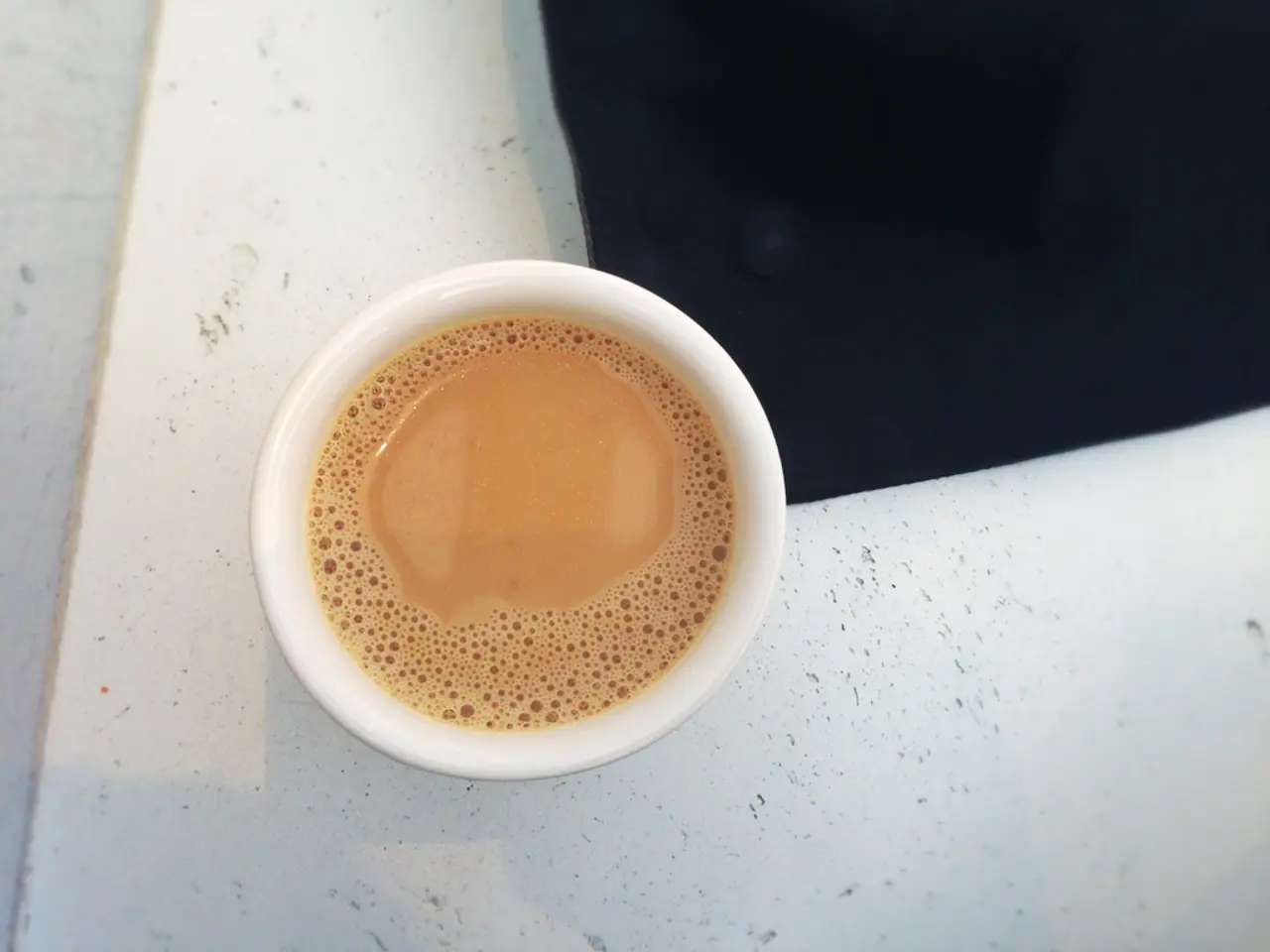Preparing a cup of Matcha tea, a favored Morning beverage offering sustained energy and mental sharpness, joins the growing list of coffee substitutes recognized for their health advantages.
Mushroom coffee has emerged as an intriguing alternative to traditional coffee, offering a milder energy boost and additional health benefits. Unlike regular coffee, which contains 95-150 mg of caffeine per cup, mushroom coffee typically boasts a lower caffeine content of 40-60 mg per cup [1]. This lower caffeine level provides a smoother energy boost, with fewer jitters and reduced likelihood of caffeine-related anxiety.
Mushroom coffee's unique selling point lies in its medicinal mushroom extracts, such as cordyceps, lion’s mane, reishi, and others. These adaptogenic mushrooms can promote better focus, enhance immunity, reduce stress, improve stamina, and offer neuroprotective effects due to their antioxidant, anti-inflammatory, and adaptogenic properties [1][2][3][4].
However, mushroom coffee is not without potential risks. It may interact negatively with certain medications, such as blood thinners, increasing bleeding risk. It can also cause allergic reactions in individuals sensitive to mushrooms, ranging from skin rashes and digestive discomfort to severe reactions like breathing difficulty and dizziness. Some people may experience digestive issues such as bloating or diarrhea due to mushroom fibers [2][4].
Kombucha, a fermented tea, is celebrated for its gut health benefits and mild stimulant effects. It contains 3 to 6 percent caffeine, depending on how it's brewed [5]. Kombucha is rich in probiotics that nourish the gut's "good" bacteria, and it is also rich in B vitamins, which help the body metabolize nutrients into cellular fuel.
Yerba mate, a popular South American drink, contains roughly as much caffeine as coffee and offers a steady caffeine release, providing sustained energy without the jitters. It is rich in polyphenols, vitamins, and minerals not typically found in traditional caffeinated beverages [6]. Research shows that yerba mate can boost mental alertness and enhance physical performance, and it has antimicrobial properties, supports weight loss, and can lower blood sugar, reduce cholesterol, and combat chronic inflammation [7].
Guarana, a plant native to the Amazon rainforest, is rich in stimulating compounds like theophylline and theobromine. These compounds boost cognitive performance, reduce fatigue, and increase alertness [8]. Guarana berries contain 2 to 8 percent caffeine, exceeding the 1 to 3 percent in coffee beans.
Yaupon tea, brewed from the leaves of the yaupon holly, a caffeinated plant native to the United States, contains 0.1 to 2 percent caffeine, less than coffee's 1 to 3 percent. It enhances mood and alertness due to the presence of xanthines like theobromine.
Matcha green tea delivers more than just a caffeine kick, with around 70 milligrams of caffeine per serving. Its unique combination of caffeine and antioxidants boosts brain energy while promoting relaxation, thanks to the amino acid L-theanine [9].
In conclusion, each of these alternative energy drinks offers unique benefits and potential risks. Mushroom coffee provides a gentler stimulation and added health benefits from medicinal mushrooms, while kombucha offers gut health benefits and mild stimulant effects. Yerba mate delivers a steady caffeine release, providing sustained energy, and guarana offers a strong caffeine boost with additional stimulating compounds. Yaupon tea is a lesser-known caffeinated beverage native to the United States, and matcha green tea offers a relaxed energy boost with added antioxidants. It is essential to consider personal tolerance, health conditions, and potential interactions with medications when choosing an energy drink.
- Mushroom coffee's unique properties include promoting better focus, enhancing immunity, reducing stress, improving stamina, and offering neuroprotective effects, thanks to its medicinal mushroom extracts.
- Kombucha, in addition to its mild stimulant effects, is also rich in probiotics that nourish the gut's "good" bacteria and B vitamins, which help the body metabolize nutrients into cellular fuel.
- Yerba mate, like coffee, offers a steady caffeine release, providing sustained energy without the jitters, and also contains polyphenols, vitamins, and minerals not typically found in traditional caffeinated beverages.
- Guarana, native to the Amazon rainforest, contains stimulating compounds like theophylline and theobromine, which boost cognitive performance, reduce fatigue, and increase alertness.
- Matcha green tea not only provides a caffeine kick, but also offers a unique combination of caffeine and antioxidants that boost brain energy while promoting relaxation, thanks to the amino acid L-theanine.




